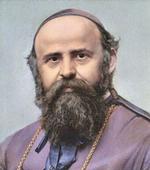Quick Hits: Not always what they seem: Deaconesses, Jesuits, Christmas displays
By Dr. Jeff Mirus ( bio - articles - email ) | Sep 29, 2016
Deaconesses: The Vatican newspaper, L’Osservatore Romano, published an article by Carlo Carletti today which could inadvertently lead even the elect astray (cf. Mt 24:24, Mk 13:22). A professor of archeology, Carletti wrote that Pope Francis’ study of women in the diaconate should begin with St. Paul who, in Romans 16:1, referred to “our sister Phoebe, a deaconess”.
Unfortunately, there is not much to study there. The terms used to designate different functions and positions within the Church were initially very fluid. Titles such as apostle, prophet, teacher, bishop, presbyter, elder, and deacon were used in different ways in different regions. Terminology did not begin to settle into a uniform pattern until the second century, and even then regional differences were common.
In other words, Carletti’s claim that St. Paul included women in his ministry in the East, in contrast to the practice in the West, depends on the faulty assumption that terminology was used consistently. The question at issue is not whether women played important roles in the Catholic community from the first (they did, everywhere, beginning with Christ himself). The question is whether women ever received the sacrament of orders. Since the term “deacon” means “servant”, it was widely used to designate those who voluntarily devoted themselves to serving the members of the Church in a variety of different ways. But there is no evidence that any of the women referred to as deacons or deaconesses were ever ordained.
Felix Just, SJ, indicates the fluidity of the early use of the terms in a brief survey online. It is also worth noting that the subject of the ordination of women to the diaconate has been studied innumerable times over the past four hundred years. Many regard the historical work of Aimé George Martimort, published by Ignatius Press in 1986, to be definitive. And then there is the theological examination of the question by Gerhard Müller, the current head of the Congregation for the Doctrine of the Faith, published in 2002. (See Amazon links below.) There does not appear to be any new evidence from which the Church could reach a different conclusion.
A new Jesuit Black Pope: Since Fr. Adolfo Nicolás, at age 80, has requested and received permission from Pope Francis to resign his position as Superior General of the Society of Jesus, the Jesuits will elect a new superior general at its upcoming 36th General Congregation in October. Every Catholic should pray for good results, because the Jesuits today continue to be very closely associated with both Modernism and the subversion of moral theology, especially approval of homosexuality. This poses severe problems to the Church since they still set the tone at so many (allegedly) Catholic universities.
We all hoped that the election of a Jesuit as Pope—a man who had experienced first-hand the deep flaws in the contemporary version of the Society—would tend to spark a renewal. I know that Pope Francis has been privately briefed on the moral and spiritual horrors that characterize the Society in North America, but Jesuit reform has not become a papal priority. Therefore, our attention is drawn naturally once again to the Superior General of the Society—the Black Pope. Sometimes prayer is not merely the best answer, but the only answer.
Opposition to a Christmas display: Don’t be too quick to accuse town officials in Plantation, Florida of anti-Christian bias. They’re trying to force a family to scale back its enormous Christmas display. However, despite claims of religious liberty, homeowners Mark and Kathy Hyatt may not have remembered to put Christ in Christmas. Features include a Santa Claus, a huge screen looping Disney movies, and a Ferris wheel.
I suppose, like anyone who has ever tried to justify anything, they’re “doing it for the children”. But would you (devout Catholic that you are) want a mammoth garish display with 200,000 lights (count them) attracting thousands of cars and visitors each December to your neighborhood? Would you welcome this invasion of your privacy? Would you be happier living on a carnival midway? Would you be tempted to pull the plug?
All comments are moderated. To lighten our editing burden, only current donors are allowed to Sound Off. If you are a current donor, log in to see the comment form; otherwise please support our work, and Sound Off!








